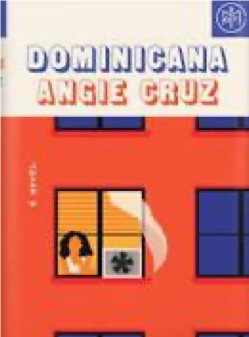
Angie Cruz
Dominicana, A Novel
Flatiron Books, 2019
319 pages
$26.99
Reviewed by Sophia Monegro
Angie Cruz’s Dominicana introduces a singular yet culturally commonplace story into the Dominican-American literary canon. The novel interjects in conversations about Dominican history, diasporic longing, transnational consciousness, and domestic violence by centering fifteen-year-old Ana Canción’s life as an immigrant child bride. Ana’s story is not an uncommon one— for women across cultures and Cruz’s Dominican mother whose own marital circumstances inspired this book— yet the silence around narratives like Ana’s speak to the stakes of this novel. Other Dominican-American novels, like In the Time of the Butterflies (1994) by Julia Alvarez and The Brief Wondrous Life of Oscar Wao (2007)by Junot Díaz, have engaged violence against women. However, that violence was political in the case of Alvarez’s novel or marginal to Díaz’s plot; violence acted as a minor character within the larger theater of Dictator Rafael Trujillo politics and lengthy explorations of Dominican masculinity. Divergently, Dominicana centers women’s experiences with quotidian domestic violence and the moments of freedom and youthful joy that mitigate the abuse. Those moments make this novel a charming story of girlhood filled with naiveté, sexual exploration, and an insatiable curiosity about the world(s).
In“Writing the Latinx Bildungsroman,” Lyn Di Iorio suggests that Cruz and other U.S. Latina/o/x novels, like Ernesto Quiñonez’s Taína, are innovating the classic bildungsroman through coming of age stories that span across two societies (March 10, 2020). Unlike the common refrain, this novel is both de aquí y de allá. Ana belongs to two worlds: her home-pueblo in Los Guayacanes, Dominican Republic and to Washington Heights, New York.Perched on the window of her apartment on 168th street, Ana bears witness to the months-long memorial of Malcom X, all the while, her nostalgia for home consumes her as she reads about the open warfare tearing Santo Domingo apart in 1965. Ana’s dual social and geo-political enculturation develops her as a transnational subject.
Ana’s socialization begins during the aftermath of the Trujillato, in 1960s Los Guyacanes where Ana lives with her mama, papá, siblings and cousins. Mamá views Ana as the “winning lottery ticket” that will save the family from rural poverty. Ana’s anointment as the chosen daughter is both pragmatic and racialized. Pragmatically, Ana is the only choice once her older sister Teresa’s determination to love freely results in pregnancy. Racially, Ana’s green eyes highlight her value in post-Trujillo Dominican society that glorifies Hispanicity. Her eyes demarcate Ana as “a curious beauty,” especially for Juan Ruiz who feels superior to his gaggle of brothers based on his “lighter skin” and “straight hair.” The mother’s choice to marry off her daughter to Juan, a man twice her age, is a politic born out of necessity. Escaping Los Guyacanes becomes Ana’s involuntary inheritance.
With Ana’s sacrifice, Cruz urges us to consider what Dominican immigrant women give up in the name of family uplift.
Ana suffers a great deal to ensure her family escapes the Dominican countryside. On their wedding night in Santo Domingo, Juan rapes Ana. In New York, he beats her and continues his affair with a married Puerto Rican woman while continuously accosting Ana for sex. Yet, Cruz does not make Juan a one-dimensional character. In the opening scene, Juan is introduced as grotesque: drunk, belligerent, and barking like a dog. All the while he also serenades Ana with his majestic voice. This initial paradox foreshadows Juan’s dual role as a villain and a benefactor. After Juan first hits Ana, he buys her a TV that allows her to begin practicing her English. One night, Juan arrives drunk and arouses Ana’s first orgasm while raping her. Shortly after, Ana becomes pregnant, and their child facilitates Juan’s ability to secure mamá and her brother Lenny’s tourist visas. Ana’s perception of Juan as her monster and her angel speaks to the intricacy of the Dominican family structure.
Cruz also endows Ana with the same level of nuance. Ana’s daily refusal of Juan’s abuse takes form both as calculated strategy and joyful realizations of her youthful curiosities. As a means of survival, Ana learns to distance herself from Juan to evade his sexual desires. Ana refuses Juan with all the tools at her disposal: her gaze, “but not even through my eyes will I allow him to enter;” defying his instructions to not feed the pigeons; and by squirreling away money to send to her family. Among Juan’s several jobs, he runs a suit hustling business that he entrusts Ana with. She begins to sell more of the inventory than she discloses and stores the money in her ceramic Dominicana doll that becomes an allegory for her own economic independence.
Juan’s handsome, younger, and darker-skinned brother César becomes the predominant outlet for Ana’s curiosity about the city. During Juan’s months-long trip in the Dominican Republic, he leaves César to look out for pregnant Ana. César pays careful attention to Ana and her desires. Listening to her entrepreneurial ambition, César encourages Ana to sell her cooking to his co-workers. César dotes on Ana: sewing her dresses, taking her to Coney Island for her first hot dog, and to the Audubon Ballroom for dancing. When they realize their desire for one another, César asks Ana to run away to Boston with him just as Juan is set to return with news of mamá and Lenny’s arrival. At this crossroad, Ana is forced to make a choice: are there limits to the martyrdom she will undergo in the name of family?
Author Angie Cruz’s pithy and minimalistic writing style strategically delivers us a story that is everything but simple. Dominicana is equally a meditation on Cruz’s mother’s story, the mother-daughter relationship between Ana and mamá, and the exchange we as Dominicans of the diaspora have with the migrant stories that engendered our existence. Cruz calls upon us to consider the power of culture through the budding eyes of a child that became a woman as the price to live across two worlds.

